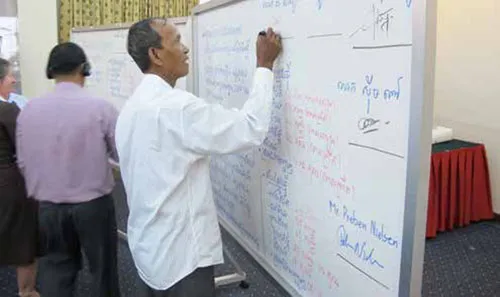![]()
Problem Solving and Compliance Reviews
This section discusses ongoing complaints.
Greater Mekong Subregion: Rehabilitation of the Railway in Cambodia Project
ADB and the Government of Australia (through the Australian Government Overseas Aid Program [AusAID]) are working with the Royal Government of Cambodia and other aid partners to rehabilitate the national railway in Cambodia. The new railway will position Cambodia as a true subregional transport hub, creating new jobs and business opportunities. The project has been under way since 2010 but has been plagued with delays, mostly because of the need to move 4,164 families that live alongside the dilapidated railway tracks.
On 21 November 2011, OSPF received a complaint from project-affected households through an NGO regarding resettlement, compensation, indebtedness, public services at relocation sites, and the lack of information and consultation.1
OSPF determined the complaint to be eligible (under the former procedure) in January 2012 and began a problem-solving process with the affected households, government, ADB, and AusAID to address concerns. (See Appendix for another complaint received but deemed ineligible.)
Complainants’ representative signing the agreed-upon course of action during the multistakeholder consultation workshop, August 2012.
A review and assessment of the concerns was conducted in January 2012 and led to a course of action to address them. The course of action was discussed and agreed upon in a multistakeholder workshop conducted by OSPF in Phnom Penh in August. The multistakeholder workshop included parties involved in the complaint: (i) representatives of the affected households; (ii) the Interministerial Resettlement Committee (IRC), Resettlement Department, and Ministry of Economy and Finance; (iii) AusAID; and (iv) ADB.
Four activities were identified in the course of action for all project sites: (i) capacity development for affected people on problem solving; (ii) one-on-one sessions to discuss and resolve individual concerns; (iii) assessment and development of a plan for addressing concerns related to infrastructure and services at the relocation sites; and (iv) planning for development activities, including the Income Restoration Program (IRP) of the Resettlement Department and the Expanded Income Restoration Program (EIRP) of ADB and AusAID. Activities in the course of action were implemented between September and October 2012.
From Challenges to Results
Implementation started with capacity development on problem solving. A 1-day workshop was organized for all project stakeholders to understand problem solving, and how each party can play a part in resolving issues. The project also included time to explain the process of one-on-one sessions with the affected persons, detailing the procedure and rules for engagement.
The purpose of the one-on-one sessions was to resolve individual concerns of affected persons lodged in the complaint.
The purpose of the one-on-one sessions was to resolve individual concerns of affected persons lodged in the complaint. Through mediation, OSPF facilitated a dialogue between affected persons and IRC, ADB, and AusAID. In cases where the complaint involved a disagreement on compensation, the Resettlement Department, ADB, and AusAID walked affected persons through their agreements/contracts. This helped the affected persons to understand the policy regarding compensation, and how their compensation was calculated based on the size and type of their home. In some instances, discrepancies were found in the contracts, which led to correcting them. In each session, an agreement was signed by the affected persons, IRC, and OSPF to underline the fact that the complaint had been resolved and that OSPF could close it.
Some complaints were made about the infrastructure and services provided at the relocation sites. Assessment workshops were organized to investigate these problems and resolve them through a multistakeholder process. In all areas, affected households, the local government, IRC, and ADB have agreed that each will play its role in resolving the problems. For water-related problems, water users groups will be established to organize the community to collect and pay for water, while the local government and the project will assist in the construction of household connections. Payment for water use will be based on tariffs agreed to by the community. The water users groups will also be responsible for operation and maintenance (O&M) of the water system, and the collection of water fees from the households.
This project is unprecedented in its scope, scale, and complexity. Problems inevitably arise during resettlement, but the key is to work to resolve them.
The ADB project was designed to include income restoration for relocated persons. The IRP run by the government is aiming to restore the incomes of people who are ...


